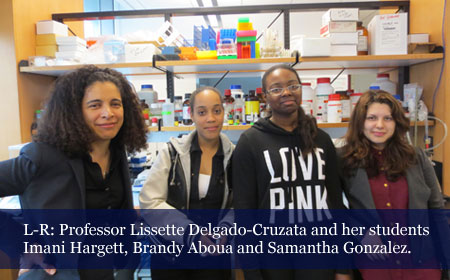Newsroom Archive

Assistant Professor Lissette Delgado-Cruzata in the Science Department has received a grant from the CUNY Diversity Fund for a program she developed called Minority Initiative for Female Science Students (MIXXS2).
Delgado-Cruzata created MIXXS2 because of her own experiences and observations of the science field in the United States. In graduate school, she noticed there were very few professors and students who were women and minorities. When she came to John Jay and saw its large minority student body, she felt there “had to be a way to do something, so students go to graduate school and believe they can do research. This initiative is a platform for students to come together, where freshman can talk to seniors and graduates. We are approaching these issues in scientific ways so we can really tell what they need and give the right support.”
“I wanted to foster relationships, networking, and support systems, allowing freshmen to meet seniors, professionals who are women and minorities. The students ask questions about family, about children, what classes they should take sooner or later, and questions about gender, race, financial support, access to mentoring, preparation,” said Delgado-Cruzata.
“We’re delighted to see Lissette get this project off the ground with CUNY funding. Understanding the barriers that underrepresented students face in science is an important area of study, and this project nicely complements other efforts we have on campus to support success in the sciences,” said Professor Anthony Carpi, Interim Associate Provost for Research Advancement
The funding allowed her to hire college assistants and administer a survey to ascertain the needs of students. The results of the survey given to minority female science students presented questions about educational barriers and their perception of barriers to success.
The survey revealed that students, while at John Jay, did not feel that being a minority or female was a barrier to them being successful, but when asked the same questions about their future career they thought it was possible to experience obstacles or challenges because of their race or gender.
The next phase will include administering the survey to the 300 minority female students in forensic sciences, conduct statistical analysis of that data, and submit it to a scientific journal for publication.
Three students, Brandy Aboua, Samantha Gonzalez and Imani Hargett, have worked extensively in assisting Delgado-Cruzata with the organizing of the initiative’s activities, designing the logo and name, creating Facebook and Instagram accounts and searching and creating a list of organizations that offer research and scholarship opportunities to minority women.
Imani Hargett, a junior and Forensic Science major, focused on developing a survey and research questions around the initiative and presented her preliminary results during John Jay’s Research and Creativity week. Hargett said she has always been interested in science because her mother is a nurse. She remembers reading medical dictionaries as a child just for ‘fun’.
“I think that this initiative is important because it provides a place where minority women can receive inspiration, encouragement and empowerment. It helps to dispel the negative connotations that may come with studying science and help to further incorporate an underrepresented group into the science community,” said Hargett.
Samantha Gonzalez Benhumea, a sophomore, is studying biology because since she was a child she has wanted to be a doctor.
“The objective of MIXXS2 is to learn how to keep minority female students in the sciences. The moment when they feel they might not have what it takes to stay in this field we want to provide that support. It’s a matter of thinking that, ‘I can do this’ and being told ‘you can do this.’ There is a contradiction in the media and society about women in sciences. Students ask, ‘Can I wear heels, be attractive and be a scientist.’ There are stereotypes that persist, but we want students to know you can be anything and be a scientist, it’s ok,” said Gonzalez Benhumea.
 Inside JJC (Faculty & Staff)
Inside JJC (Faculty & Staff) Technology Services Status
Technology Services Status

